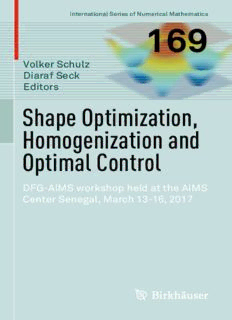
Shape Optimization, Homogenization and Optimal Control: DFG-AIMS workshop held at the AIMS Center Senegal, March 13-16, 2017 PDF
Preview Shape Optimization, Homogenization and Optimal Control: DFG-AIMS workshop held at the AIMS Center Senegal, March 13-16, 2017
International Series of Numerical Mathematics 169 Volker Schulz Diaraf Seck Editors Shape Optimization, Homogenization and Optimal Control DFG-AIMS workshop held at the AIMS Center Senegal, March 13-16, 2017 ISNM InternationalSeries ofNumerical Mathematics Volume169 ManagingEditors G.Leugering,Erlangen,Germany M.Hintermueller,Berlin,Germany AssociateEditors V.N.Starovoitov,Novosibirsk,Russia N.Kenmochi,Kita-ku,Kyoto,Japan R.W.Hoppe,Houston,USA Z.Chen,Beijing,China HonoraryEditor K.-H.Hoffmann,Garching,Germany Moreinformationaboutthisseriesathttp://www.springer.com/series/4819 Volker Schulz • Diaraf Seck Editors Shape Optimization, Homogenization and Optimal Control DFG-AIMS workshop held at the AIMS Center Senegal, March 13-16, 2017 Editors VolkerSchulz DiarafSeck FBIVAbt.Mathematik DépartementdeMathématiquesdela Universita¨tTrier UniversitéCheikhAntaDiopdeDaka Trier,Germany Dakar-Fann,Senegal ISSN0373-3149 ISSN2296-6072 (electronic) InternationalSeriesofNumericalMathematics ISBN978-3-319-90468-9 ISBN978-3-319-90469-6 (eBook) https://doi.org/10.1007/978-3-319-90469-6 LibraryofCongressControlNumber:2018951124 MathematicsSubjectClassification(2010):49Q10,35B27,49J15,49J20,65K10 ©SpringerInternationalPublishingAG,partofSpringerNature2018 Thisworkissubjecttocopyright.AllrightsarereservedbythePublisher,whetherthewholeorpartof thematerialisconcerned,specificallytherightsoftranslation,reprinting,reuseofillustrations,recitation, broadcasting,reproductiononmicrofilmsorinanyotherphysicalway,andtransmissionorinformation storageandretrieval,electronicadaptation,computersoftware,orbysimilarordissimilarmethodology nowknownorhereafterdeveloped. Theuseofgeneraldescriptivenames,registerednames,trademarks,servicemarks,etc.inthispublication doesnotimply,evenintheabsenceofaspecificstatement,thatsuchnamesareexemptfromtherelevant protectivelawsandregulationsandthereforefreeforgeneraluse. Thepublisher,theauthorsandtheeditorsaresafetoassumethattheadviceandinformationinthisbook arebelievedtobetrueandaccurateatthedateofpublication.Neitherthepublishernortheauthorsor theeditorsgiveawarranty,expressorimplied,withrespecttothematerialcontainedhereinorforany errorsoromissionsthatmayhavebeenmade.Thepublisherremainsneutralwithregardtojurisdictional claimsinpublishedmapsandinstitutionalaffiliations. Printedonacid-freepaper This book is published under the imprint Birkhäuser, www.birkhauser-science.com by the registered companySpringerNatureSwitzerlandAGpartofSpringerNature. Theregisteredcompanyaddressis:Gewerbestrasse11,6330Cham,Switzerland Preface This volume contains the proceedings of the DFG-AIMS Workshop on shape optimization,homogenizationandcontrol,heldatAIMSSénégalinMbour,Séné- gal, on March 13–16, 2017. This workshop joined mathematicians from Sénégal, Germany and various other countries to discuss the topics of shape optimization, homogenizationandcontrolandtoexploremutualinterestsandoptionsoffurther jointresearch. The contributionsin this volumegive an insightinto currentresearchactivities inAfrica,Germanyandinternationallyinthosefields.Seedsforcollaborationcan be found in the first four papers in the field of homogenization. Modelling and optimalcontrolin partialdifferentialequationsis the topic of the nextsix papers, again mixed from Africa and Germany. Finally, new results in the field of shape optimizationarediscussedinthefinalinternationalthreepapers. This workshop has been supported by the Deutsche Forschungsgemeinschaft (DFG),whichisthelargestself-governingfundingorganisationforbasic research inGermanyandinEurope,andbytheAfricanInstituteforMathematicalSciences (AIMS)inSenegal,whichisoneofsixcentresofapan-Africannetworkofcentres of excellence for postgraduate education, research and outreach in mathematical sciences. We wish to thank all the contributors to this workshop for making it an outstandingscientific and intellectual event. We are convincedthat this workshop and the contributions collected in this volume show that future collaborations in the field of mathematics between Africa and Germany are already visible on the horizon. Trier,Germany VolkerSchulz Dakar-Fann,Senegal DiarafSeck v Contents HomogenizationinMagnetic-Shape-MemoryPolymerComposites....... 1 SergioConti,MartinLenz,MatthäusPawelczyk,andMartinRumpf HomogenizationofStochasticParabolicEquations inVaryingDomains.............................................................. 19 MogtabaA.Y.MohammedandMamadouSango Two-Scale Convergence: Obviousness of the Choice of Test Functions?NotAlways.......................................................... 41 HubertNnang CorrectorProblemandHomogenizationof NonlinearElliptic MonotonePDE ................................................................... 57 JeanLouisWoukeng Instantaneous Optimal Controlof Friction Dominated Flow inaGas-Network................................................................. 75 GünterLeugeringandGisèleMophou MultilevelIterationsfortheCombinedMovingHorizonEstimation andNonlinearModelPredictiveControlforPDEModels.................. 89 EkaterinaKostinaandGregorKriwet SomeRecentDevelopmentsinOptimalControlofMultiphaseFlows..... 113 MichaelHintermüllerandTobiasKeil LocalizedModelReductioninPDEConstrainedOptimization............ 143 MarioOhlberger,MichaelSchaefer,andFelixSchindler Numerical Simulation for a Dimensionless Coupled System ofShallow WaterEquationwithLongTerm Dynamicof Sand DunesEquation .................................................................. 165 MouhamadouA.M.T.BaldéandDiarafSeck vii viii Contents CouplingtheNavier-StokesEquationswithaShortTermDynamic ofSandDunes .................................................................... 191 IbrahimaFaye,MariamaNdiaye,andDiarafSeck BranchingStructuresinElasticShapeOptimization........................ 213 NoraLüthen,MartinRumpf,SaschaTölkes,andOrestisVantzos ShapeandTopologicalDerivativesviaOneSidedDifferentiation oftheMinimaxofLagrangianFunctionals ................................... 227 MichelC.Delfour OnOptimizationTransferOperatorsinShapeSpaces...................... 259 VolkerH.SchulzandKathrinWelker Homogenization in Magnetic-Shape-Memory Polymer Composites SergioConti,MartinLenz,MatthäusPawelczyk,andMartinRumpf Abstract Magnetic-shape-memory materials (e.g. specific NiMnGa alloys) react with a large change of shape to the presence of an external magnetic field. As an alternative for the difficult to manufacture single crystal of these alloys we study composite materials in which small magnetic-shape-memory particles are embeddedinapolymermatrix.Themacroscopicpropertiesofthecompositedepend strongly on the geometry of the microstructure and on the characteristics of the particlesandthepolymer. We present a variational model based on micromagnetism and elasticity, and derive via homogenization an effective macroscopic model under the assumption that the microstructure is periodic. We then study numerically the resulting cell problem,and discuss the effectof the microstructureon the macroscopicmaterial behavior. Our results may be used to optimize the shape of the particles and the microstructure. Keywords Homogenization · Magneticshapememory · Micromagnetism · Calculusofvariations · Shapeoptimization S.Conti((cid:2)) InstitutfürAngewandteMathematik,UniversitätBonn,Bonn,Germany e-mail:[email protected] M.Lenz InstitutfürNumerischeSimulation,UniversitätBonn,Bonn,Germany e-mail:[email protected] M.Pawelczyk InstitutfürGeometrie,TechnischeUniversitätDresden,Dresden,Germany e-mail:[email protected] M.Rumpf InstitutfürNumerischeSimulation,UniversitätBonn,Bonn,Germany e-mail:[email protected] ©SpringerInternationalPublishingAG,partofSpringerNature2018 1 V.Schulz,D.Seck(eds.),ShapeOptimization,Homogenization andOptimalControl,InternationalSeriesofNumericalMathematics169, https://doi.org/10.1007/978-3-319-90469-6_1 2 S.Contietal. MathematicsSubjectClassification(2010). Primary74Q05;Secondary74F15 1 Introduction Thepeculiarmechanicalbehaviorofmagneticshapememory(MSM)alloysrenders them interesting for many applications. At the same time, they give rise to a new class of models, whose mathematical study is challenging. MSM alloys are multiferroic materials, which combine a magnetic phase transition with a shape- memory one. The deformation driven by a magnetic field deformation is due to a coupling between the two order parameters,which arises from the differencein magneticanisotropybetweenthe elastic variants. A typicalexampleis a NiMnGa alloy[15,21,26,29,30]. Shape-memorymetalsarecharacterizedbyaphasetransformationfromahigh- temperature, high-symmetry phase, called austenite, to a low-temperature, low- symmetryphase, called martensite. Since the pointgroupof the martensite lattice issmallerthanintheaustenitephase,thereareanumberofdifferentvariantsofthe martensiticphase,whichareobtainedfromtheausteniteviadifferentbutsymmetry- related eigenstrains. Whereas in ceramic materials elastic phase transformations typically generate spontaneousstrains of less than 1%, in alloys the deformations canbesignificant.ForexampleinNiMnGasinglecrystalsthedeformationbetween two martensitic variants is about 11%. The practical exploitation of the shape- memoryeffectforactuationhasbeenhinderedbythefactthatthetransitionbetween austenite and martensite can often be induced only by slow heating and cooling processes.Furthermore,itisdifficulttoselectonevariantovertheother.Thisleads in typical situations to low-temperature states characterized by a fine mixture of thedifferentvariants,inwhichmartensiteappearswithoutsignificantmacroscopic deformation. The couplingof the structuralphase transformationto a magneticfield renders the materials much easier to control. The difference in anisotropy between the different variants of the martensitic phase leads to a coupling between the mag- netizationandtheeigenstrainandprovidesasimplemechanismforselectingoneof thevariantsovertheothers.Atleastincleansinglecrystals,largestrainsupto11% havebeeninducedbytheapplicationofexternalmagneticfields[21,26,29,30]. Itishoweverpracticallyverydifficulttoproducesinglecrystalsofgoodquality. Additionally, single crystals tend to be brittle. At the same time, in polycrystals the deformation is blocked by incompatibilities at the grain boundaries. It has thereforebeen proposedto use small single-crystalMSM particlesembeddedin a softermatrix[12,13,16,25,27],althoughmagneticallyinducedstrainsaretypically smallerthaninsinglecrystals[17,18,28].Thecompositegeometryopenstheway foroptimizationoftheparticleshapeandingeneralofthemicrostructure. Inthispaperwereviewrecentmathematicalprogressandextendtheanalysisof MSM-polymercomposites.A modelbasedonmicromagnetismandelasticity was developedin [7], and will be presented in Sect.2 below.Under the assumptionof
Description: